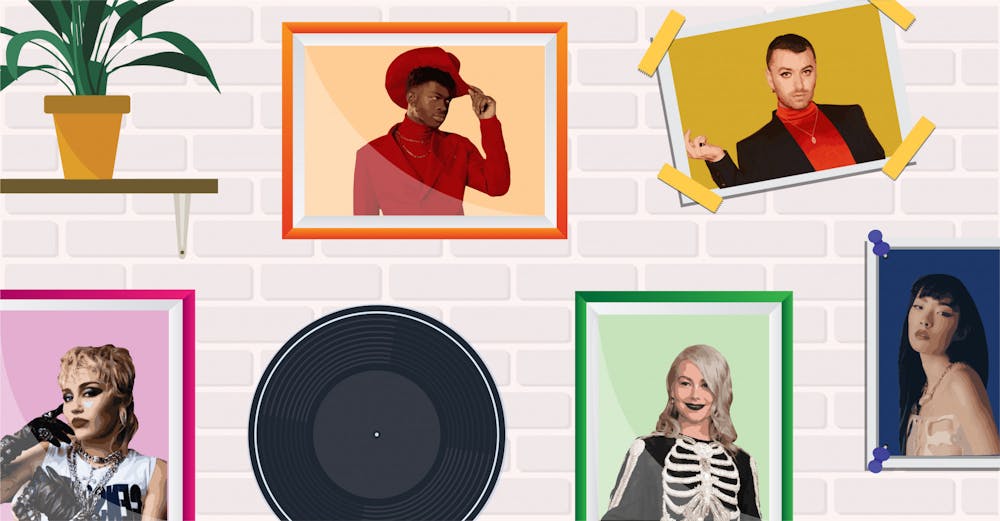Throughout history, LGBTQ artists explored various genres to cement themselves in the music industry. LGBTQ community members shared their thoughts on how queer musicians influence their lives, the U.S. music industry and society.
Twentyfirst century LGBTQ musicians tend to create music that embodies themes of acceptance, speaking your truth and owning your identity. Songs like Lady Gaga’s well-known anthem “Born This Way,” remind listeners to honestly love themselves with no regrets.
Long before influence from artists like Lady Gaga, Sam Smith and Lil Nas X dominated the LGBTQ space, the roots of LGBTQ music trace back as early as the 1890s with Black jazz artists like Tony Jackson and Bessie Smith, who brought queer influence to the musical world.
Early LGBTQ musicians didn’t benefit from the same freedoms as those in today’s industry. Attitudes and discriminatory policies ruled previous generations, but queer artists, including Elton John and Big Freedia, contributed to and established queer artistry in mainstream music.
Adam Leme, 23, is a musician in Gainesville. He writes and plays bass in the local band RA’SBRY. As a bisexual cis-man practicing in today’s music industry, he said it’s important to acknowledge how far the LGBTQ community has come.
Leme said it’s necessary to celebrate Black transgender women and drag queens who spearheaded the gay rights movement. He specifically mentioned the impact of drag queen and activist Marsha P. Johnson who was one of the prominent figures in the Stonewall Uprising of 1969.
“The best music in the world and the biggest movements have always been championed by the most marginalized groups in our society,” he said. “We have to recognize everybody who was at the forefront of LGBTQ history.”
Leme said certain groups of people, such as cis-men, are more likely to receive positive responses from society about embracing feminity than others.
“From my perspective, I’ve noticed society celebrates artists like Harry Styles and Kurt Cobain who perform femininity in ways such as putting on a dress or painting their nails,” he said. “I've also been doing my nails since I was 17, and I like that. It's all praise. But at the same time, you have to realize somebody did this before you, and they got ridiculed.”
Leme recognizes SOPHIE as one of his favorite musicians from the LGBTQ community. Leme said although she’s recently died, her influence in pop music as a transgender woman and music producer is undeniable and lives on.
Despite obstacles members of the LGBTQ community overcame to make their way to the mainstream, queer artists are dominating the charts more than ever before.
Lil Nas X, a gay Black man, made Billboard Hot 100 history with a remix of his country rap song “Old Town Road - Remix” featuring Billy Ray Cyrus. The song holds the record for most consecutive weeks on the Billboard Chart– one week as a solo song and 18 weeks with the remix. He also surpassed Elton John’s record for “Candle In The Wind (1997)” with “Old Town Road - Remix” as the longest-leading No. 1 single by a queer artist in Billboard history.
Today, LGBTQ artists can generally express themselves more than their predecessors. But some members of the community, such as UF alumnus Jarrett Repasky, think society can grow in its acceptance towards queer people owning their sexuality.
“Queer people, especially people of color, are overly sexualized for everything,” Repasky said. “It seems some people are afraid of queer people being comfortable with themselves and openly expressing themselves.”
In response to Lil Nas X’s viral music video ''MONTERO (Call Me By Your Name),” Repasky, who is queer and non-gender conforming, said they support Lil Nas X embracing his sexuality.
The music video received mixed feedback as it depicts both LGBTQ and religious imagery and themes. In an article by Time Magazine, historians analyze the queer and religious imagery behind the visuals.
Repasky said, “it's interesting how some ultra conservative people think the video is different from any other venue or person who is considered revealing.”
Students like Piper Penney, 18, said LGBTQ musicians’ presence in mainstream pop is beneficial to normalizing the queer experience. The second-year UF political science student said it’s refreshing to hear songs outside of the “typical heterosexual perspective.”
“Not every queer song necessarily has to be activism,” Penney said. “In general, queer artists openly discussing their experiences helps normalize queer relationships.”
Penney said one of her favorite artists, Phoebe Bridgers, doesn’t always discuss her sexuality in her music, but the music inspires her as a queer woman.
The LGBTQ community claims certain musicians as gay icons, an adoring term to address allies or fellow LGBTQ artists with large queer fanbases. Cher, Dolly Parton, Madonna, Mariah Carey, and Britney Spears are examples of gay icons cherished by the community. The community also embraces gay anthems which, similarly, is a term used to reference songs created by the LGBTQ community and their allies.
Derek Ginoris, 22, is an international studies and Italian studies senior at UF. He said artists like Britney Spears, although not queer, impact the LGBTQ community and embody what being a gay icon is all about.
“To create a gay anthem means an artist has been a pioneer in their own way, whatever that may be, and has truly expressed themselves,” Ginoris said. “For Britney Spears, it's been in a sexually liberating way. It’s how Britney can relate to our struggle of expressing ourselves in a way society tells us not to, being tied down and told we’re wrong.”
As a gay man, Ginoris said upbeat music from LGBTQ artists like Rina Sawayama’s “Comme Des Garçons (Like The Boys)” makes him “feel fierce.” Slower songs like “Rainbow” by Kesha tend to make him emotional.
Repasky said music is very important for empowering marginalized communities and helping individuals realize their internalized struggles.
“Sometimes being queer is something you can’t show on the outside. Music is something that can reaffirm ourselves and help us discover from within. Music is a staple, especially for the queer community.”
The Avenue curated a playlist featuring songs from LGBTQ artists like Freddie Mercury, Miley Cyrus, King Princess, Victoria Monét and more. The playlist also includes songs by allies like Janet Jackson, Ariana Grande and more. Listen here.
Contact Karter at knancy@alligator.org. Follow her on Twitter @writtenbykarter.






